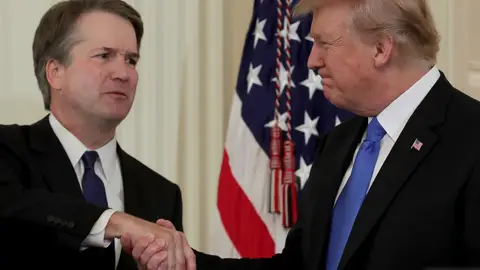Did Trump Nominate Kavanaugh to SCOTUS to Avoid Mueller's Subpoena?

Brett Kavanaugh, Trump's nominee for the Supreme Court, is likely to face tough questions from the Senate over an article he wrote in 2009 urging Congress to pass a law protecting sitting presidents from investigation until after they leave office.
Kavanaugh played a major role in Ken Starr's investigation into former President Bill Clinton, which led to his impeachment. But he said as a result of that experience, as well as his time working for former President George W. Bush, he changed his mind on the issue.
Kavanaugh wrote that presidents should not have to face criminal investigations, such as civil suits and indictments.
"Having seen first-hand how complex and difficult that job is, I believe it vital that the President be able to focus on his never-ending tasks with as few distractions as possible," he said.
"The country wants the President to be 'one of us' who bears the same responsibilities of citizenship that all share. But I believe that the President should be excused from some of the burdens of ordinary citizenship while serving in office."
He suggested that Clinton could have focused more on capturing or killing Osama bin Laden, for example, had he not been distracted by the Paula Jones sexual harassment case.
Special counsel Robert Mueller has already expressed his willingness to subpoena Trump as part of the Russia investigation if necessary. The president's lawyers responded to that threat by saying they were confident they would be successful in a legal challenge regarding whether a sitting president could be forced to comply with such an order.
That question could find its way to the Supreme Court, and if Kavanaugh is able to make it through the nomination process he could help decide if the president is allowed to ignore a subpoena, and evade criminal prosecution until after he is out of office.
“It is not at all far-fetched to think that the question of whether President Trump must respond to a subpoena could come before the Supreme Court shortly after the confirmation process,” Walter Dellinger, who served as acting United States solicitor general under Clinton, told The New York Times.
“I don’t know of any justice who has staked out as strong a position on presidential immunity even from questioning as Judge Kavanaugh has," he added.
Democrats have seized on the issue, saying it presents a clear conflict of interests.
Sen. Chuck Schumer said Kavanaugh "seems exactly like the kind of man President Trump would want on the Supreme Court if legal issues from the Mueller probe arise."
"The president of the United States should not be beyond criminal investigations," said Sen. Cory Booker, who is pushing for the Senate to refuse to confirm Kavanaugh until after the Mueller probe is finished.
Kavanaugh needs 51 votes in the Senate, the same number of seats the Republicans currently hold.





